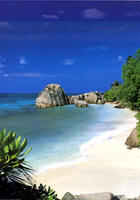Both are urgent priorities for both donors and the Haitian government alike. But what if you could solve both problems at once?
Gael Pressoir, a geneticist and former researcher at Cornell University, says it's possible. Pressoir has been exploring the use of a plant that can be transformed not only into food, but fuel. The plant, called jatropha, is already being used in African countries. Likewise, an edible kind of jatropha is grown by indigenous communities in Mexico.
Pressoir believes it the plant can be grown in Haiti, too — with potentially incredible results. Jatropha is rich in protein like a soybean meal. Oil from jatropha can also be burned to fuel stoves, which would decrease the need to cut through forests for charcoal. Meanwhile, jatropha is a tree that can likewise be used to reforest barren land and stabilize its soil.
And wait — there's more. Jatropha oil can be transformed into biodiesel, and in a country largely dependent on diesel, that's a fact that could make a huge fiscal difference. According to Pressoir, diesel accounts for 50% of Haiti's fuel dependency. (Just last year, Haiti imported $380 million in diesel for its electrical generators and you can read detailed coverage on this in the New York Times here.)
“Diesel is the second largest commodity market in Haiti,” says Pressoir. “So there is a huge local market for diesel or diesel substitute.”
Right now, Pressoir and his nonprofit venture CHIBAS are working with the help of USAID and L'Agence Nationale De La Recherche in France to explore what could be a market of half a billion dollars. Haiti's Ministry of Agriculture is backing the jatropha initiative, too, though the government worries jatropha might interfere with traditional food crops. Those concerns have been addressed, says Pressoir, and more than a million acres have been identified for jatropha plantations that won't bleed the local farming economy.
Is jatropha a viable solution to both Haiti’s food and energy security issues? I'd say it looks quite promising. The plant is a sound investment — and a potentially powerful way to kill two birds with one stone.To read more and see the full article on Jatropha World Costa Rica click here



































